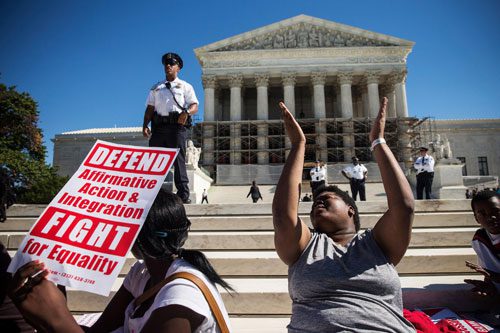
WASHINGTON — The U.S. Supreme Court on Tuesday further undermined the use of racial preferences in higher education by upholding a voter-approved Michigan law that banned the practice in university admissions.
The 6-2 vote and the four opinions issued by justices in the majority revealed divisions on the court as to the legal rationale in rejecting civil rights groups’ challenge to the ban.
Justice Sonia Sotomayor, who wrote the sole dissenting opinion, read excerpts from the bench, calling the decision a blow to “historically marginalized groups, which rely on the federal courts to protect their constitutional rights.”
The court emphasized that it was not deciding the larger and divisive question of whether affirmative action admission policies can be lawful.
But the decision made it clear that voter-approved affirmative action bans can withstand legal challenges. It could encourage other states to pass similar bans and deter challenges to existing bans in seven other states.
Civil rights groups had argued that the 2006 Michigan constitutional amendment that passed as a ballot initiative had imposed burdens on racial minorities in violation of the U.S. Constitution’s guarantee of equal protection.
Affirmative action programs, first advocated in the 1960s to combat discrimination against racial minorities, have faced a backlash from conservatives in recent decades. Court rulings and action by states have chipped away at the practice.
In November 2012, a divided 6th U.S. Circuit Court of Appeals in Cincinnati ruled Michigan’s ban unconstitutional, prompting the state to appeal to the Supreme Court.
Michigan’s Republican attorney general, Bill Schuette, said in an interview that the Supreme Court had provided other states with a “constitutional roadmap” if they wish to enact similar laws and had “heard the voices of voters who overwhelmingly voted to require equal treatment in admissions.”
The other states with similar bans are Arizona, California, Florida, Nebraska, New Hampshire, Oklahoma and Washington.
Some states that do not currently have bans – Alabama, Georgia and West Virginia – backed Michigan. Ward Connerly, a veteran affirmative action opponent who helped pass the California ban, said no states are actively pursuing similar voter-approved measures.
Civil rights activists and some Democrats decried the ruling.
“Our nation has come a long way in seeking to end discrimination, but our work is far from complete at a time of continued underrepresentation of minorities in high education and many walks of life,” said Michigan Democratic Representative John Conyers, one of the senior black members of Congress.






Leave a Reply